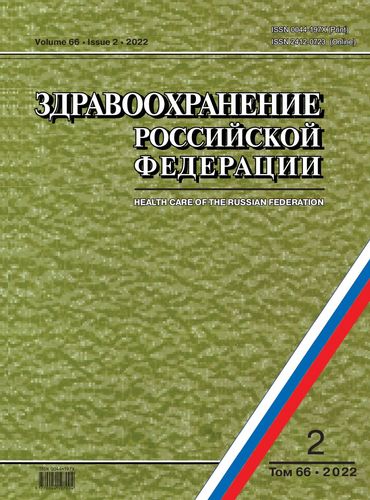Occupational burnout syndrome in pharmaceutical workers
- 作者: Nagornyak Y.G.1, Kanakina T.A.1, Fokin V.A.1, Muzyra Y.A.1, Ratkin A.V.1, Ruzlyaeva E.A.1
-
隶属关系:
- Siberian State Medical University
- 期: 卷 66, 编号 2 (2022)
- 页面: 145-151
- 栏目: OCCUPATIONAL MEDICINE
- ##submission.dateSubmitted##: 25.10.2024
- URL: https://hum-ecol.ru/0044-197X/article/view/637775
- DOI: https://doi.org/10.47470/0044-197X-2022-66-2-145-151
- ID: 637775
如何引用文章
全文:
详细
Introduction. It has been confirmed by a number of foreign and domestic studies, that occupational burnout (OB) is a common phenomenon among medical and pharmaceutical workers. Scientific and practical interest to the study of the causes of OB is due to the specific features of pharmaceutical industry, which associated with the daily communication of pharmacy employees with a large number of visitors who seek for their professional advice.
Material and methods. The Maslach Burnout Inventory questionnaire, adapted for pharmaceutical workers, was used to assess the level of OB and to identify factors that could contribute to it’s development. The study involved employees of pharmaceutical institutions from the Tomsk (TR) and the Novosibirsk (NR) regions as well as from the Republic of Sakha (Yakutia) — RS (Ya).
Results. OB signs were fpound to be typical for pharmaceutical specialists in all tested regions, while more than ⅓ of the respondents have a high degree of this syndrome. The highest degree of OB is common among pharmaceutical workers in the TR, where emotional exhaustion by an integral indicator is expressed in 42.5% of respondents. In the RS(Ya) and the NR, the average degree is observed — in 62.5% and 60.5% of respondents, respectively. At the same time, the indicators of personal achievement reduction are expressed to a low degree: most specialists are able to find the right solutions in conflict situations, adequately cope with emotional problems, and understand and feel their colleagues well.
Limitations. When studying occupational burnout among pharmaceutical workers of pharmaceutical institutions in the TR and NR as well as RS (Ya), the total 85 questionnaires were evaluated.
Discussion. The obtained data showed differences in the OB severity among pharmaceutical specialists depending on the region. The main factors contributing to the development of OB include the age and length of service, the level of education, the reason for selecting an occupation and the presence of children. Satisfaction with the chosen occupation depends upon the attitude of management towards employees and the level of salary that allows feeling financial independence.
Conclusion. Thus, pharmaceutical employees are subject to burnout at work. This problem is a theoretical and practical interest with its goal to find opportunities to prevent the development of burnout and reduce its impact.
Contribution of the authors:
Nagornyak Yu.G., Kanakina T.A. — research concept, processing of material, writing the text and compilation of the list of literature, editing.
Fokin V.A. — statistical data processing.
Muzyra Yu.A. — collection of material.
Ratkin A.V. — research concept.
Ruzlyaeva E.A. — editing.
All authors are responsible for the integrity of all parts of the manuscript and approval of the manuscript final version.
Acknowledgment. The study had no sponsorship.
Conflict of interest. The authors declare no conflict of interest.
Received: July 09, 2020
Accepted: October 20, 2020
Published: May 04, 2022
作者简介
Yulia Nagornyak
Siberian State Medical University
编辑信件的主要联系方式.
Email: ul.11@yandex.ru
ORCID iD: 0000-0001-5112-5020
Candidate of Biological Sciences, Associate Professor of the Department of Hygiene Siberian State Medical University, Tomsk, 634050, Russian Federation.
e-mail: lul.11@yandex.ru
俄罗斯联邦Tatiana Kanakina
Siberian State Medical University
Email: noemail@neicon.ru
ORCID iD: 0000-0002-7316-7229
俄罗斯联邦
Vasiliy Fokin
Siberian State Medical University
Email: noemail@neicon.ru
ORCID iD: 0000-0002-9881-2298
俄罗斯联邦
Yuriy Muzyra
Siberian State Medical University
Email: noemail@neicon.ru
ORCID iD: 0000-0001-9672-3577
俄罗斯联邦
Alexandr Ratkin
Siberian State Medical University
Email: noemail@neicon.ru
ORCID iD: 0000-0003-1438-5119
俄罗斯联邦
Evgenia Ruzlyaeva
Siberian State Medical University
Email: noemail@neicon.ru
ORCID iD: 0000-0001-5109-5845
俄罗斯联邦
参考
- Nagornyak Yu.G., Kanakina T.A., Fokin V.A. Study of syndrome of emotional burnout in students of the faculty of pharmacy. Zdravookhranenie Rossiyskoy Federatsii. 2018; 62(5): 254–8. https://doi.org/10.18821/0044-197X-2018-62-5-254-258 (in Russian)
- Glushevskaya E.V. Study of pharmacy staff burnout. Remedium.Menedzhment. 2012; (3): 64–7. (in Russian)
- Kobyakova O.S., Deev I.A., Kulikov E.S., Pimenov I.D., Khomyakov K.V. Burnout in doctors and medical errors. Is there a connection? Sotsial’nye aspekty zdorov’ya naseleniya. 2016; 47(1). https://doi.org/10.21045/2071-5021-2016-47-1-5 (in Russian)
- Maslach C., Jackson S.E., Leiter M.P. Maslach Burnout Inventory Manual. Palo Alto, CA: Consulting Psychologists Press; 1996.
- Kobyakova O.S., Deev I.A., Kulikov E.S., Khomyakov K.V., Tyufilin D.S., Zagromova T.A., et al. The professional burnout of physicians of various specialties. Zdravookhranenie Rossiyskoy Federatsii. 2017; 61(6): 322–9. https://doi.org/10.18821/0044-197X-2017-61-6-322-329 (in Russian)
- Vodopyanova N.E., Starchenkova E.S. Syndrome of Burnout: Diagnostics and Prevention [Sindrom vygoraniya: diagnostika i profilaktika]. St. Petersburg: Piter; 2008. (in Russian)
- Soloveva O.V., Temrokova S.B. Psychological prevention of professional burnout of medical professionals. Vektor nauki Tol’yattinskogo gosudarstvennogo universiteta. Seriya: Pedagogika, psikhologiya. 2016; (3): 96–9. https://doi.org/10.18323/2221-5662-2016-3-96-99 (in Russian)
- Vorozhtsova E.S., Soloninina A.V. The study of the level of burnout of pharmacists as the consequences of conflicts in the workplace. Meditsinskiy al’manakh. 2019; 5–6(61): 104–8. https://doi.org/10.21145/2499-9954-2019-5-104-108 (in Russian)
- Vaez M. Health and quality of life during years at university: Diss. Stockholm; 2004.
- Barclay L. Burnout in medical students linked to self-reported unprofessional conduct. JAMA. 2010; 304: 1173–80.
- Fishman B.E., Goltsova N.V. The reality of emotional burnout among students of medical college. Fundamental’nye issledovaniya. 2014; (9–12): 2774–8. (in Russian)
补充文件








